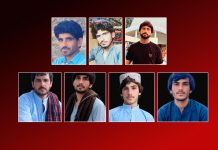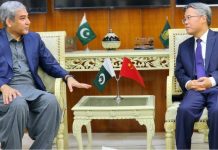Baloch political activists have accused Islamabad of violating human rights, inequality and rise of religious fundamentalists in Balochistan, which is responsible for the destruction of cultural identity of the Baloch people.
Addressing the 39th session of the United National Human Rights Council in Geneva, Munir Mengal, president of the Baloch Voice Association, said: ‘During the last seventy years of the Islamic state’s existence, its security forces, have treated the Baloch people as occupants. Their xenophobia about the Baloch people is most evident in their crude behaviour and disproportionate response to the most genuine and fundamental demands of the Baloch people to honour their dignity, identity and culture, and respect their sovereignty on their land.’
He added: ‘Pakistan is intolerant of the spirit of toleration and liberalism displayed by the Baloch people. It has tried systematically to transplant religious fanatical groups from outside Balochistan to change their culture. Pakistan, as a state, pledged to International covenant on Economic, Social and Cultural Rights, it should have recognised the cultural specificity of the Baloch people. It has, instead, tried to use private militias of terrorist religious groups to unleash a reign of terror to the secular, nationalist and peace-loving people.’
Baloch activist and ex-chairperson of BSO-A, Karima Baloch, also accused Islamabad of racial discrimination against the Baloch people.
‘Because the Baloch people are culturally different from mainstream Pakistan, they are treated with prejudice in every sphere of life. They are considered different and their way of life is regarded as uncivilised and obsolete, she said.
Karima Baloch also stated that the Baloch voted against acceding with Pakistan and their land was taken over by the Pakistan military with forces in March, 1948.
Balochistan, which is rich in natural resources like gold, gas and other reserves remains one of the poorest areas of the region.
Recent findings of the United National Development Programme (UNDP) have shown distressing conditions of human development in Balochistan, since most of its districts fall under the very low category.
The Human Development Index (HDI) of Balochistan can be compared with countries like Chad, Niger and other countries of Central Africa.






























